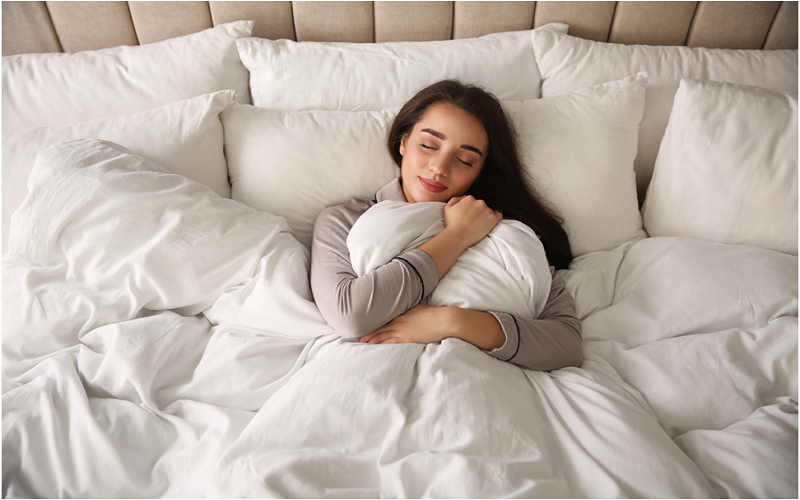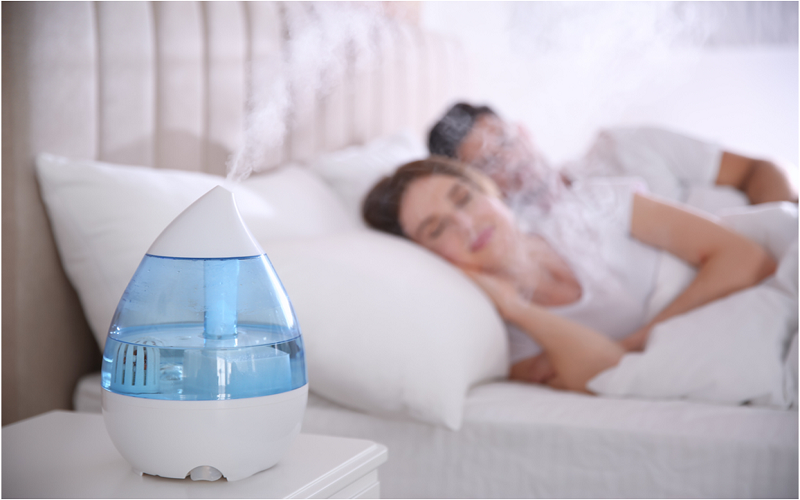7 Tips for a Winter Bedtime Routine

As winter sets in, the importance of a well-structured and comfortable bedtime routine becomes crucial. Our guide provides practical tips to enhance your sleep experience during the colder months. It covers various aspects such as maintaining a consistent sleep schedule, adjusting your bedroom’s temperature for optimal comfort, choosing the best mattresses for comfort and adapting your skincare routine to counter the dry winter air. These suggestions are designed to address the unique challenges posed by winter, ensuring a cozy and restful night and helping you navigate the season’s shorter days and colder nights with ease.
1) Keep a Consistent Sleep Schedule
Maintaining a consistent bedtime is essential for cultivating good sleep habits, particularly during winter months when days are shorter and nights are longer. Establishing and adhering to a fixed sleep schedule helps synchronize your body’s internal clock, making it easier for you to fall asleep and wake up naturally. This practice aids in achieving a deep and restful sleep, which is crucial for overall health and well-being. That goes for whether you’re at home in your own bed or curled up on sleeper sofas at a relative’s house for the holidays.
It’s important not to be swayed by the early onset of darkness in winter. While it may be tempting to go to bed earlier as it gets dark outside, doing so can disrupt your body’s natural rhythm. Aim to choose a bedtime that allows for at least seven hours of sleep each night. Sticking to this schedule, even on weekends, reinforces your body’s sleep-wake cycle and improves sleep quality over time.
2) Fine Tune Your Room Temperature
Creating the right environment in your bedroom is key to a good night’s sleep, especially during winter. This involves ensuring your room maintains a moderate temperature that’s neither too hot nor too cold. Achieving the right balance in room temperature can impact the quality of your sleep. It’s recommended to keep your bedroom cool, as a cooler environment typically promotes better sleep.
If your bedroom has a ceiling fan, adjusting its direction can be beneficial in the winter. By setting your fan to rotate clockwise at a low speed, it can redistribute the warm air that rises to the ceiling back down to the floor level. This creates a more even temperature distribution in the room, avoiding the discomfort of warm air accumulating at the ceiling while the floor remains cold. This simple adjustment can make a substantial difference in your overall comfort during sleep.

Source: JR-stock/Shutterstock.com
3) Create a Winter-Ready Bedroom Environment
Preparing your bedroom for winter involves more than just adjusting the thermostat. It’s about creating a cozy sanctuary that invites restful sleep. Central to this is your bed — the heart of any bedroom. Start by ensuring you have a high-quality mattress on your boucle bed that provides the right balance of support and comfort. A good mattress is the foundation of a good night’s sleep. In winter, this becomes even more important as your body seeks extra comfort and warmth.
Once you’ve got the right mattress, the next step is to dress it appropriately for the season. Consider using luxurious Cariloha sheets, renowned for their softness and comfort. These sheets are not only cozy but also breathable, helping to regulate your body temperature throughout the night. They offer the perfect combination of warmth for the winter without causing overheating. The feel of soft, high-quality sheets can increase the quality of your sleep, making you feel pampered and relaxed.
4) Use a Humidifier
The dry air of winter can be a subtle yet significant disruptor of sleep. Utilizing a humidifier in your bedroom can mitigate this issue by adding necessary moisture to the air. This not only creates a more comfortable sleeping environment but also helps alleviate common winter ailments such as dry skin and nasal congestion, which can interfere with sleep.
To maximize its benefits, consider turning on the humidifier about 30 minutes before you go to bed. This allows the room to reach an optimal level of humidity, ensuring that the air is moist and comfortable by the time you are ready to sleep. A well-humidified room can bolster the quality of your sleep, making it easier to breathe and rest comfortably throughout the night.

Source: New Africa/Shutterstock.com
5) Adopt a Winter Skincare Routine
Winter conditions can be harsh on your skin, with dry air and reduced exposure to vitamin D taking a toll. Therefore, adapting your skincare routine to the season is a wise move. This might involve using more hydrating products or incorporating a winter-specific face mask into your regimen. The goal is to replenish the moisture that your skin loses due to the dry winter air.
Increasing the use of moisturizers and choosing products with nourishing ingredients can make a significant difference in maintaining your skin’s health during the colder months. Remember, comfortable skin leads to better sleep, as it reduces the likelihood of irritation or discomfort during the night. A little extra care for your skin not only helps preserve its health but also contributes to a more restful and rejuvenating sleep.
6) Enjoy a Warm Beverage
Incorporating a warm, non-caffeinated beverage into your nightly routine can enhance your sleep experience. A cup of herbal tea, such as chamomile or valerian, not only provides a sense of warmth and comfort but also possesses natural properties that promote relaxation and sleep readiness. This simple act can become a calming ritual, signaling to your body that it’s time to wind down and prepare for rest.
When selecting your evening beverage, focus on teas that are known for their sleep-inducing qualities. Avoiding caffeine is crucial as it can interfere with your ability to fall asleep. By making this a regular part of your bedtime routine, you create a cozy, tranquil environment conducive to unwinding and gradually transitioning into sleep mode.
7) Choose Comfortable Winter Sleepwear
Dressing appropriately for bed during the winter months is an often overlooked aspect of a good sleep routine. Opting for comfortable, warm pajamas and slippers will increase your sense of coziness, making it easier to relax and drift off to sleep. The right sleepwear adds an extra layer of warmth, helping to regulate your body temperature throughout the night.
When selecting your winter sleepwear, prioritize materials and designs that make you feel snug and relaxed. The tactile sensation of soft, warm fabrics can be incredibly soothing, setting the tone for a restful night. Remember, the goal is to feel comfortably warm, not overly hot, so choosing breathable fabrics is also important.





